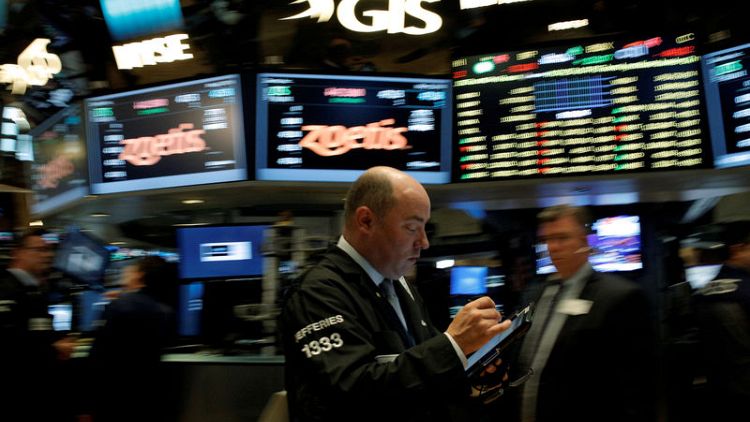By Rahul Karunakar
BENGALURU (Reuters) - Global funds recommended a bigger safety buffer in February, with cash holdings raised to their highest in more than three years and equity allocations cut to the lowest in nearly two, a Reuters poll showed on Thursday.
Many top equity indexes posted their best start to a year in decades, but a slowdown is underway in several major economies and the still-unresolved trade war between the U.S. and China has kept investors cautious.
A monthly Reuters poll of 43 fund managers around the globe, taken Feb 14-27, showed cash holdings - a key gauge of investor caution - were increased to their highest since June 2015, to 7.2 percent from 6.2 percent last month.
Asset managers reduced recommendations to equity exposure to 45.9 percent of the model global portfolio from 48.5 percent, the lowest since March 2017. Bond allocations were nudged up to 39.3 percent of the portfolio from 39.1 percent.
Nearly 65 percent of fund managers who answered an additional question said the risk for global stocks by mid-year was for a sharp fall. The remaining said the opposite.
The more defensive approach among long-term investors lines up with findings from a separate Reuters poll of equity market strategists, who cut their 2019 stock markets outlook and who also came to the same conclusion on risk.
"At the beginning of the year, we saw opportunities to increase risk exposure, starting with emerging markets and credit - now partially exploited - and we are now taking some profits. We expect the year to be quite volatile with the market mood continuing to swing between fear and greed," said Pascal Blanqué, chief investment officer at Amundi Asset Management, in Paris.
But nearly half the fund managers in the latest poll who answered a separate question said investor risk-taking will stay the same over the next 12 months. The others were almost evenly split between an increase and decrease.
"Markets began 2019 pricing in gloom and doom after major indexes fell ... in 2018. If the major risks facing the market, rising interest rates and a full-blown trade war, are avoided, equities can rally to new record highs," said Alan Gayle, president at Via Nova Investment Management, in Washinton DC.
"Interest rate risks have clearly subsided, and trade negotiations appear to be moving closer to a resolution. These are very positive developments for stock markets."
Across equity portfolios, fund managers increased allocations to North American stocks to the highest since at least the start of 2013, according to a sub-set of respondents in the poll.
"We expect the U.S. economy to stay strong relative to other major economies and there is a risk of USD strength in the next risk-off move which could hurt emerging market relative to developed market equities," said Trevor Greetham, head of multi-asset strategies fund at Royal London Asset Management.
A regional breakdown also showed fund managers cutting allocations to euro zone and UK stocks this month on economic growth worries in those economies and on Britain's torturous exit process from the European Union.
"Risks to economic momentum and parallel geopolitics appear to remain on the downside," said Michael Ingram, chief market strategist at WH Ireland, in London.
"Given the sharp recovery in risk-appetite that we have seen year-to-date, it seems likely that equity market risk will increasingly lie to the downside by mid-year in the absence of more supportive fundamental momentum."
Looking ahead, many fund managers said emerging-market assets will be buying opportunities, provided the U.S. and China reach a trade deal - which several called the biggest risk if that doesn't happen.
This also echoed what sell-side equity-market strategists told Reuters in a poll conducted over the same period. [EPOLL/WRAP]
"Financial markets have seen a robust rebound since the beginning of the year with global central banks (sounding) more dovish tones, fears of an imminent recession receding and with a resolution on the war on trade looking more likely," said John Husselbee, head of multi-asset at Liontrust, in London.
"With sentiment improving these risks bring opportunity, however, significant deterioration will once again unsettle investors' nerves."
(Additional reporting and polling by Sujith Pai in Bengaluru, Fumika Inoue in Tokyo and Maria Pia Quaglia Regondi in Milan; editing by Larry King)



